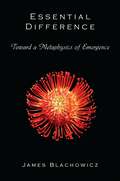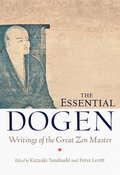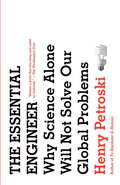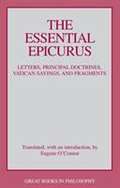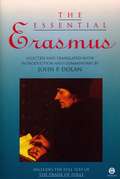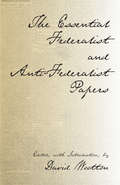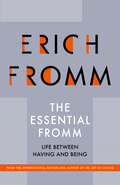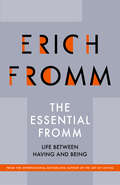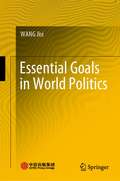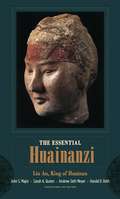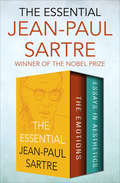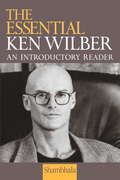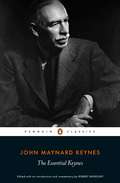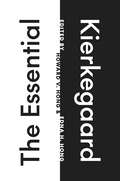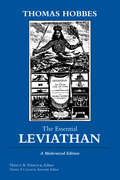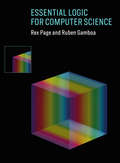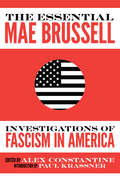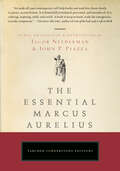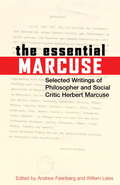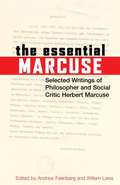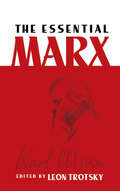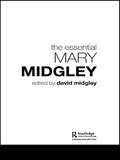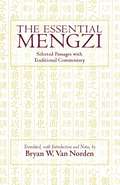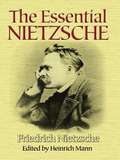- Table View
- List View
Essential Difference: Toward a Metaphysics of Emergence
by James BlachowiczFinalist for the 2015 John N. Findlay Award in Metaphysics presented by the Metaphysical Society of AmericaIs metaphysics possible? This book argues that the greatest threat to its viability derives from a self-destructive formalism. If what is essential to the nature of physical entities are the properties they have in common (as formalism holds), the inevitable result will be a reductionist collapse—leaving only "being" or physical "matter" or some other underlying ground. In Essential Difference, James Blachowicz first constructs a one-to-one historical parallel between the modern crisis surrounding formalism (Hume/Kant/Hegel) and the ancient version (Parmenides/Plato/Aristotle), focusing on the principles of differentiation and individuation that underlie Aristotle's and Hegel's antireductionist programs. He then proposes a contemporary metaphysical theory of emergence in the context of recent philosophy of science. This theory, founded on the principle of the nonderivability of actual states from possible states, holds that the differences among physical, biological, and mental phenomena are essential to any metaphysics. Essential Difference is the only focused treatment of this problem and is itself essential for any understanding of the nature of metaphysics.
The Essential Dogen: Writings of the Great Zen Master
by Peter Levitt Kazuaki TanahashiEihei Dogen (1200-1253), founder of the Soto School of Zen Buddhism, is one of the greatest religious, philosophical, and literary geniuses of Japan. His writings have been studied by Zen students for centuries, particularly his masterwork, Shobo Genzo or Treasury of the True Dharma Eye. This is the first book to offer the great master's incisive wisdom in short selections taken from the whole range of his voluminous works. The pithy and powerful readings, arranged according to theme, provide a perfect introduction to Dogen--and inspire spiritual practice in people of all traditions.
The Essential Engineer: Why Science Alone Will Not Solve Our Global Problems
by Henry PetroskiFrom the acclaimed author of The Pencil and To Engineer Is Human, The Essential Engineer is an eye-opening exploration of the ways in which science and engineering must work together to address our world&’s most pressing issues, from dealing with climate change and the prevention of natural disasters to the development of efficient automobiles and the search for renewable energy sources. While the scientist may identify problems, it falls to the engineer to solve them. It is the inherent practicality of engineering, which takes into account structural, economic, environmental, and other factors that science often does not consider, that makes engineering vital to answering our most urgent concerns.Henry Petroski takes us inside the research, development, and debates surrounding the most critical challenges of our time, exploring the feasibility of biofuels, the progress of battery-operated cars, and the question of nuclear power. He gives us an in-depth investigation of the various options for renewable energy—among them solar, wind, tidal, and ethanol—explaining the benefits and risks of each. Will windmills soon populate our landscape the way they did in previous centuries? Will synthetic trees, said to be more efficient at absorbing harmful carbon dioxide than real trees, soon dot our prairies? Will we construct a &“sunshade&” in outer space to protect ourselves from dangerous rays? In many cases, the technology already exists. What&’s needed is not so much invention as engineering.Just as the great achievements of centuries past—the steamship, the airplane, the moon landing—once seemed beyond reach, the solutions to the twenty-first century&’s problems await only a similar coordination of science and engineering. Eloquently reasoned and written, The Essential Engineer identifies and illuminates these problems—and, above all, sets out a course for putting ideas into action.
The Essential Epicurus: Letters, Principal Doctrines, Vatican Sayings, and Fragments (Great Books In Philosophy)
by Eugene O'ConnorEpicureanism is commonly regarded as the refined satisfaction of physical desires. As a philosophy, however, it also denoted the striving after an independent state of mind and body, imperturbability, and reliance on sensory data as the true basis of knowledge. Epicurus (ca. 341-271 B.C.) founded one of the most famous and influential philosophical schools of antiquity. In these remains of his vast output of scientific and ethical writings, we can trace Epicurus' views on atomism, physical sensation, duty, morality, the soul, and the nature of the gods.
The Essential Erasmus (Essentials Ser.)
by Desiderius Erasmus John DolanIn his own day a center of controversy, in the four hundred years since his death known too often solely as an apostle of mockery and irreverence, Erasmus can be seen today in a new light—as a humanist whose concen is at once contemporary and Christian. <P><P>The Essential Erasmus is the first single volume in English to show the full spectrum of this Renaissance man's thought, which is no less profound because it is expressed with the grace, wit, and ironic detachment only a great writer can achieve.
The Essential Federalist and Anti-Federalist Papers
by Alexander Hamilton James Madison John Jay David WoottonHere, in a single volume, is a selection of the classic critiques of the new Constitution penned by such ardent defenders of states' rights and personal liberty as George Mason, Patrick Henry, and Melancton Smith; pro-Constitution writings by James Wilson and Noah Webster; and thirty-three of the best-known and most crucial Federalist Papers by Alexander Hamilton, James Madison, and John Jay. The texts of the chief constitutional documents of the early Republic are included as well.David Wootton's illuminating Introduction examines the history of such American principles of government as checks and balances, the separation of powers, representation by election, and judicial independence--including their roots in the largely Scottish, English, and French new science of politics. It also offers suggestions for reading The Federalist, the classic elaboration of these principles written in defense of a new Constitution that sought to apply them to the young Republic.
The Essential Fromm: Life Between Having and Being
by Erich FrommEssays on human alienation, mode of existence, consumerism, narcissism, and more from &“both a psychologist of penetration and a writer of ability&” (Chicago Tribune). As Erich Fromm points out, ours is &“a life between having and being&”—between mere having and healthy being, between destructiveness and creativity, between narcissism and productive self-understanding, between passivity and the joy of positive activity. The alternatives of having and being are basic orientations of our character and determine our behavior. The mostly unpublished and unknown texts featured in The Essential Fromm encapsulate the psychologist&’s views on the fulfilling life. To put down roots yet remain free is what the late Erich Fromm called the art of being. It is the secret of happiness.
The Essential Fromm
by Erich Fromm Rainer FunkAs Fromm points out, ours is "a life between having and being"--between mere having and healthy being, between destructiveness and creativity, between narcissism and productive self-understanding, between passivity and the joy of positive activity. The alternatives of having and being are basic orientations of our character and determine our behavior. The mostly unpublished and unknown texts featured in The Essential Fromm encapsulate Fromm's views on the fulfilling life. To put down roots yet remain free is what the late Erich Fromm called the art of being. It is the secret of happiness.
Essential Goals in World Politics
by Jisi WangThis book presents a unique effort to apply political philosophy to realities of the world. Among numerous objectives that states, politicians, and individuals try to reach, some are vague, like power, interest, and happiness. Some others, like democracy, order, and rule of law, are ways and means to serve more fundamental purposes. While national reunification is seen as prerequisite on the political agenda of the People’s Republic of China and both South and North Koreas, and religious purity is regarded as essential to many Muslim communities, these are not universally accepted principal goals in the world. The author identifies and defines security, wealth, faith, justice, and freedom as five ultimate goals in world politics and explains why they are central. Without jargons and using many cases in China and other countries, the author illustrates that different countries at different times have varied priorities in their national politics, but they must provide security, sustain economic growth, set up a value system, maintain social justice, and secure personal freedom for their citizens. Although the world today has been relatively peaceful and accumulated much more wealth as compared to the past centuries, vacuums of faith and morality, conflicting beliefs, and lack of social justice are threatening mankind. In theory, the five ultimate goals should be reached simultaneously and reinforce each other. However, in practice they are often in contradiction. For example, national security might be strengthened at the expense of prosperity, and industrialization for economic growth has sacrificed nontraditional security interests such as the environment. The accumulation of wealth often results in its unequal distribution and grievances about injustice, and freedom and equality are regarded by some political thinkers as “natural enemies” to each other. A virtuous state should be able to reach all the five goals, while a bad state may not have even one of them. Looking around the world today, Denmark in Europe and Japan in Asia are closer to a virtuous state than most other countries despite their own deficiencies, but they are generally homogeneous in terms of ethnicity and culture. Singapore, with its ethnic diversity, has to limit freedom to obtain other goals. This book compares the development paths of China, the United States, and some other countries to demonstrate their advantages and disadvantages in becoming a better polity.
The Essential Huainanzi (Translations from the Asian Classics)
by An Li, King of HuainanCompiled in the second century B.C.E, the Huainanzi clarifies a crucial period in the development of Chinese conceptions of the cosmos, human nature, and the social order. Outlining "all that a modern monarch needs to know," the text emphasizes rigorous self-cultivation and mental discipline, attributing successful rule to a balance of broad knowledge, diligent application, and penetrating wisdom.In 2010, the editors of this volume completed the first complete English-language translation of the Huainanzi, opening exciting new pathways in the study of philosophy, Asian studies, political science, and Asian literature. This abridgement contains essential selections from each of the Huainanzi's twenty-one chapters and adds a new introduction and chapter descriptions. The text represents a remarkable synthesis of Daoist classics, such as the Laozi and the Zhuangzi; works associated with the Confucian tradition, such as the Changes, the Odes, and the Documents; and a range of other foundational philosophical and literary works, from the Mozi to the Hanfeizi. The abridgement preserves the Huainanzi's special rhetorical features, such as its parallel prose, verse, and unique compositional techniques. For decades, Western scholars overlooked the Huainanzi's sophisticated structure, creative content, and rich historical value, yet all that changed with the translation of the full text. Designed for classroom use and general readers, The Essential Huainanzi continues to increase awareness of this brilliant work and change our understanding of early Chinese history.
The Essential Huainanzi: Liu An, King of Huainan
by Major Meyer Roth John S. Queen Sarah A. Andrew Seth Harold D.Columbia University Press’s widely anticipated, complete translation of the Huainanzi, published in 2010, opened exciting new pathways in the study of classical Chinese philosophy and literature. Compiled in the second century B.C.E., the Huainanzi is a critical work of early Chinese thought, clarifying a crucial period in the development of Chinese conceptions of the cosmos, human nature, and the social order. This abridgement contains essential selections from each of the Huainanzi’s twenty-one chapters and adds a new introduction and chapter descriptions. Designed for classroom use and general readers, it allows even greater access to this central work of Chinese intellectual history. Outlining “all that a modern monarch needs to know” in order to govern efficaciously, the Huainanzi emphasizes rigorous self-cultivation and mental discipline, attributing successful rule to a balance of broad knowledge, diligent application, and penetrating wisdom. The text represents a remarkable synthesis of Daoist classics, such as the Laozi and the Zhuangzi; works associated with the Confucian tradition, such as the Changes, the Odes, and the Documents; and a range of other foundational philosophical and literary texts, from the Mozi to the Hanfeizi. This abridgement preserves the Huainanzi’s special rhetorical features, such as its parallel prose and verse, and its unique compositional techniques, making its form and content accessible to students, specialists of later China, and audiences new to Chinese history and thought. For decades, Western scholars overlooked the Huainanzi’s sophisticated structure, creative content, and rich historical value, yet all that changed with the translation of the full text. The Essential Huainanzi continues to increase awareness of this brilliant work and change our understanding of early Chinese history.
The Essential Jean-Paul Sartre: The Emotions and Essays in Aesthetics
by Jean-Paul SartreThe renowned French philosopher lays the foundation for an Existentialist approach to psychology and aesthetics in this pair of classic works. In The Emotions: Outline of a Theory, Jean-Paul Sartre explores the role of emotions in the human psyche, presenting a phenomenological approach to psychology. Analyzing the universal, yet subjective, experiences of fear, lust, anguish, and melancholy, Sartre asserts that human beings develop their emotional capabilities from a very early age, which helps them identify and understand the names and qualities of their feelings later in life. Essays in Aesthetics is a provocative collection that explores the nature of art and its meaning. Sartre considers the artist&’s &“function,&” and the relation between art and the human condition. Engaging with the works of Tintoretto, Calder, Lapoujade, Titian, Raphael, and Michaelangelo, Sartre offers a fascinating analysis of the creative process. The result is a vibrant manifesto of existentialist aesthetics.
The Essential Ken Wilber
by Ken WilberEver since the publication of his first book, The Spectrum of Consciousness, written when he was twenty-three, Ken Wilber has been identified as the most comprehensive philosophical thinker of our times. This introductory sampler, designed to acquaint newcomers with his work, contains brief passages from his most popular books, ranging over a variety of topics, including levels of consciousness, mystical experience, meditation practice, death, the perennial philosophy, and Wilber's integral approach to reality, integrating matter, body, mind, soul, and spirit. Here is Wilber's writing at its most reader-friendly, discussing essential ideas of the world's great psychological, philosophical, and spiritual traditions in language that is lucid, engaging, and inspirational.
The Essential Keynes
by Robert Skidelsky John Maynard KeynesThe essential writings of the 20th century's most influential economist, collected in one volume Today, John Maynard Keynes is best remembered for his pioneering development of macroeconomics, and for his advocacy of active fiscal and monetary government policy. This uniquely comprehensive selection of his work, edited by Keynes's award-winning biographer Robert Skidelsky, aims to make his work more accessible to both students of economics and the general reader. All of Keynes's major economic work is included, yet the selection goes beyond pure economics. Here too are Keynes's essential writings on philosophy, social theory and policy, and his futurist vision of a world without work. As Robert Skidelsky writes in his introduction: "People talk of the need for a new Keynes. But the old Keynes still has superlative wisdom to offer for a new age."For more than sixty-five years, Penguin has been the leading publisher of classic literature in the English-speaking world. With more than 1,500 titles, Penguin Classics represents a global bookshelf of the best works throughout history and across genres and disciplines. Readers trust the series to provide authoritative texts enhanced by introductions and notes by distinguished scholars and contemporary authors, as well as up-to-date translations by award-winning translators.From the Trade Paperback edition.
The Essential Kierkegaard
by Howard V. Hong Søren Kierkegaard Edna H. HongDrawn from the volumes of Princeton's authoritative Kierkegaard's Writings series by editors Howard and Edna Hong, the selections represent every major aspect of Kierkegaard's extraordinary career. They reveal the powerful mix of philosophy, psychology, theology, and literary criticism that made Kierkegaard one of the most compelling writers of the nineteenth century and a shaping force in the twentieth. With an introduction to Kierkegaard's writings as a whole and explanatory notes for each selection, this is the essential one-volume guide to a thinker who changed the course of modern intellectual history. The anthology begins with Kierkegaard's early journal entries and traces the development of his work chronologically to the final The Changelessness of God. The book presents generous selections from all of Kierkegaard's landmark works, including Either/Or, Fear and Trembling, Works of Love, and The Sickness unto Death, and draws new attention to a host of such lesser-known writings as Three Discourses on Imagined Occasions and The Lily of the Field and the Bird of the Air. The selections are carefully chosen to reflect the unique character of Kierkegaard's work, with its shifting pseudonyms, its complex dialogues, and its potent combination of irony, satire, sermon, polemic, humor, and fiction.
The Essential Leviathan: A Modernized Edition
by Thomas Hobbes Nancy Stanlick Daniel P. ColletteThis edition of Leviathan is intended to provide the reader with a modestly abridged text that is straightforward and accessible, while preserving Hobbes' main lines of argument and of thought. It is meant for those who wish to focus primarily on the philosophical aspects of the work, apart from its stylish but often daunting early modern prose. The editors have updated language, style, punctuation, and grammar throughout. Very long, complicated sentences have been broken into two or more sentences for enhanced readability. In some instances, terms within a sentence are rearranged for enhanced clarity. Occasionally, an equivalent contemporary word is substituted for an archaic one. Ellipses indicate omissions of more than one sentence. Care has been taken to maintain the strength, nuance, and flavor of the work, especially of Hobbes' most difficult arguments. In addition, the volume offers a general Introduction and concise headnotes to each chapter. Annotation is geared to the student or novice reader. A glossary of key terms is also included, as well as an index.
Essential Logic for Computer Science
by Rex Page Ruben GamboaAn introduction to applying predicate logic to testing and verification of software and digital circuits that focuses on applications rather than theory. Computer scientists use logic for testing and verification of software and digital circuits, but many computer science students study logic only in the context of traditional mathematics, encountering the subject in a few lectures and a handful of problem sets in a discrete math course. This book offers a more substantive and rigorous approach to logic that focuses on applications in computer science. Topics covered include predicate logic, equation-based software, automated testing and theorem proving, and large-scale computation. Formalism is emphasized, and the book employs three formal notations: traditional algebraic formulas of propositional and predicate logic; digital circuit diagrams; and the widely used partially automated theorem prover, ACL2, which provides an accessible introduction to mechanized formalism. For readers who want to see formalization in action, the text presents examples using Proof Pad, a lightweight ACL2 environment. Readers will not become ALC2 experts, but will learn how mechanized logic can benefit software and hardware engineers. In addition, 180 exercises, some of them extremely challenging, offer opportunities for problem solving. There are no prerequisites beyond high school algebra. Programming experience is not required to understand the book's equation-based approach. The book can be used in undergraduate courses in logic for computer science and introduction to computer science and in math courses for computer science students.
The Essential Mae Brussell
by Paul Krassner Mae Brussell Alex Constantine"Mae's work may be more relevant now than in her heyday. Like those of many other freedom fighters throughout history, the ghost of Mae Brussell will never rest till justice is served."--Tim Cahill"The main Brussell thesis, if I dare risk commit the sin of summary on her complex work, was that an ex-Nazi scientist-Old Boy OSS clique in the CIA using Mafia hit men changed the course of American history by bumping off one and all, high and low, who became an irritant to them."--Warren Hinkle, San Francisco Examiner columnistThe Essential Mae Brussell is a compilation of chilling essays and radio transcripts by the seminal American anti-fascist researcher, famously supported by John Lennon and Yoko Ono.Mae Brussell was a married housewife with five children living in southern California before she took up the study of fascism in America. After the Kennedy assassination, she purchased the twenty-six-volume Warren Commission Report, and compiled, for herself, evidence that Lee Harvey Oswald was, as he maintained after his arrest, a "patsy." She had a regular radio broadcast on KLRB, an independent FM radio station in Carmel, California. She also published articles in Paul Krassner's the Realist, Hustler, People's Almanac, and the Berkeley Barb. In 1983, Mae's hour-long program shifted to KAZU-FM in Pacific Grove, California, and she remained on the air weekly until her final broadcast in June 1988. On October 3, 1988, at sixty-six, Brussell died of cancer.
The Essential Marcus Aurelius
by Jacob Needleman John P. PiazzaThis inaugural-and all new-Tarcher Cornerstone Edition presents a stunningly relevant and reliable translation of the thoughts and aphorisms of the Stoic philosopher and Roman emperor Marcus Aurelius, properly placing the philosopher-king's writings within the vein of the world's great religious and ethical traditions. The late antique world possessed no voice like that of Roman emperor Marcus Aurelius (121-180 CE). His private meditations on what constitutes a good life have withstood the centuries and reach us today with the same penetrating clarity and shining light as the words of Shakespeare, Emerson, or Thoreau. In this remarkable new translation, bestselling religious philosopher Jacob Needleman and classics scholar John P. Piazza have retained the depth of Marcus's perspective on life. They have carefully selected and faithfully rendered those passages that clarify Marcus's role as someone who stood within the great religious and ethical traditions that extend throughout every culture in human history. The voice that emerges from their translation is a universal one, equally recognizable to students of Christ, Buddha, the Vedas, the Talmud, and to anyone who sincerely searches for a way of meaning in contemporary life. .
The Essential Marcuse
by William Leiss Andrew Feenberg Herbert MarcuseThe Essential Marcuse provides an overview of Herbert Marcuse's political and philosophical writing over four decades, with excerpts from his major books as well as essays from various academic journals. The most influential radical philosopher of the 1960s, Marcuse's writings are noteworthy for their uncompromising opposition to both capitalism and communism. His words are as relevant to today's society as they were at the time they were written.From the Trade Paperback edition.
The Essential Marcuse: Selected Writings of Philosopher and Social Critic Herbert Marcuse
by Dan MckananThe Essential Marcuse provides an overview of Herbert Marcuse's political and philosophical writing over four decades, with excerpts from his major books as well as essays from various academic journals. The most influential radical philosopher of the 1960s, Marcuse's writings are noteworthy for their uncompromising opposition to both capitalism and communism. His words are as relevant to today's society as they were at the time they were written.
The Essential Marx: The Communist Manifesto
by Karl Marx Leon TrotskyShortly before he was assassinated in 1940, Leon Trotsky — one of Marx's most devoted converts and a key figure in the Russian Revolution — made this selection from Capital, to which he appended his own lengthy and insightful introduction. Compact and fascinating, this invaluable work not only presents Marx's thoughts in his own words but also places them in the swirling context of the 20th century. A critical analysis of ideas that have influenced millions of lives for well over a century, this book will be an important addition to the libraries of students and instructors of economics, history, government, and Communist thought.
The Essential Mary Midgley
by David MidgleyFeared and admired in equal measure, Mary Midgley has carefully yet profoundly challenged many of the scientific and moral orthodoxies of the twentieth century. The Essential Mary Midgley collects for the first time the very best of this famous philosopher's work, described by the Financial Times as 'common sense philosophy of the highest order'. This unrivalled introduction to a great philosopher and brilliant writer incorporates carefully selected excerpts from Mary Midgley's bestselling books, including Wickedness, Beast and Man, Science and Poetry, and The Myths We Live By. With a specially written foreword by James Lovelock, this classic text presents a superb and eminently readable insight into questions she has returned to time and again in her renowned sharp prose. This anthology discusses major topics, such as the roots of human nature, reason and imagination, the myths of science and the importance of holism in thinking about science and the environment.
The Essential Mengzi: Selected Passages with Traditional Commentary
by Bryan W. Van Norden MengziThe Essential Mengzi offers a representative selection from Bryan Van Norden's acclaimed translation of the full work, including the most frequently studied passages and covering all of the work's major themes. An appendix of selections from the classic commentary of Zhu Xi--one of the most influential and insightful interpreters of Confucianism--keyed to relevant passages, provides access to the text and to its reception and interpretation. Also included are a general Introduction, timeline, glossary, and selected bibliography.
The Essential Nietzsche
by Friedrich Nietzsche Heinrich MannA prominent intellectual of the Weimar era, Heinrich Mann was a leading authority on Nietzsche. This volume consists of Mann's selections of highlights from the philosopher's works, along with an introduction that explains their significance to modern readers.Key excerpts from Nietzsche's books include passages from The Birth of Tragedy, Thoughts Out of Season, The Dawn of the Day, The Joyful Wisdom, Thus Spake Zarathustra, Beyond Good and Evil, The Genealogy of Morals, The Case of Wagner, Nietzsche Contra Wagner, The Twilight of the Idols, The Antichrist, Ecce Homo, and The Will to Power. For ease of reference, Mann has arranged the text in sections corresponding to Nietzsche's views on science, philosophy, and truth; his critiques of culture -- the use and abuse of history, Europeans and Germans, Wagner, the genealogy of morals, and nihilism; his concept of the world without God, including the birth of tragedy out of the spirit of music, the true and the apparent world, and eternal recurrence; and his confessions.
